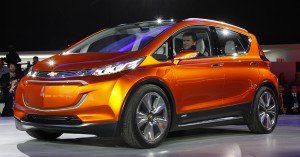
Chevrolet has confirmed one of the worst-kept secrets at the 2016 Consumer Electronics Show. During her keynote speech on Wednesday, General Motors CEO – and newly named Chairman – Mary Barra will pull the wraps off the production version of the Bolt battery-electric vehicle.
The Chevy Bolt is the first foray by GM – and, indeed, by any mainstream automaker – into the long-range electric vehicle market. The maker anticipates the vehicle will deliver about 200 miles of range per charge, or at least double what virtually all current BEV models are offering, including the current Chevrolet Spark EV.

Meanwhile, GM plans to offer the 2017 Chevrolet Bolt for less than $30,000 after factoring in the $7,500 federal tax credits currently available.
(GM plugging in a potential game changer. For more, Click Here.)
“The Bolt EV truly embodies the ingenuity that is at the core of everything we do at Chevrolet,” said Alan Batey, president of General Motors North America and head of Global Chevrolet. “The technologies and the engineering expertise behind the Bolt EV are tremendous examples of the kind of innovation we intend to offer our customers, across an array of products at a tremendous value.”
The Bolt was first revealed in concept firm last January at the North American International Auto Show in Detroit. The decision to first show the production model at the Consumer Electronics Show, then take it to Detroit for a public showing at the NAIAS, reflects the increasing significance of CES. Chevy is just one of nearly a dozen makers exhibiting in Las Vegas this year. Volkswagen, for one, is expected to reveal a long-range electric minivan concept.
The Chevrolet Bolt will become the third plug-based model offered by GM’s largest brand. It will join the second-generation Chevy Volt plug-in hybrid launched for the 2016 model-year, as well as the Spark EV. The long-term future for the latter model is not certain, however.
(Click Here for details how automakers are turning CES into a high-tech car show.)
Sales of plug-based vehicles slipped in the U.S. last year. The collapse in fuel prices was clearly a factor, according to industry analysts, but they also point to the high cost of battery-based products – and to so-called range anxiety. Many observers now believe the plug-based market won’t really take off until affordable products with a range of at least 200 miles per charge become widely available.
Helping drive down the production cost – and thus the final sticker price – global product chief Mark Reuss recently told TheDetroitBureau.com that GM has pressed hard for new battery technology. The lithium-ion cells that will go into the Bolt are expected to cost the maker just $150 a kilowatt-hour, down from almost $1,000 when the plug-in Chevy Volt was first conceived.
While GM isn’t yet revealing the size of Bolt’s battery pack, it is expected to be somewhere in the range of 50 to 60 kWh. Thus, the savings on batteries is as much as $50,000 per vehicle compared to what the pack might have cost at the beginning of the decade.
(To see more about Ford’s $4.5 billion plan for electrified products, Click Here.)
It remains to be seen whether and where Chevy might market the Bolt beyond the U.S. While electrified vehicle sales slipped in the home market last year, it surged in China. In fact, that market is now the world’s largest for plug-based vehicles. And demand is expected to surge as the auto industry faces strong government pressure to address the issue of endemic air pollution problems.








I’ve been here before. Why do I have to pay for a quarter of your car, a car I have no interest in buying for myself from a company I will not support. EV’s need to support themselves on their own marit. That is the way competition is suppose to work.
Of course, the counter argument is why are we spending a quarter — or more — of our military budget to protect our interests in the Middle East?
Paul E.
Wow, you missed on the therr’s question by a mile Paul. We spend what we deem is necessary for our protection based on past history and future peril. It’s worth noting that the Obama administration has seriously reduced the U.S. military’s ability to defend our country’s interest and safety and as soon as he is booted from office increased budgets will be mandatory to restore the strength of the U.S. military to protect our freedoms.
As far as EV subsidies there is absolutely NO REASONABLE or logical means for these gifts as EVs are personal transportation vehicles NOT public transportation. If an EV buyer is entitled to a $7,500 tax credit then so am I for buying a ULEV 2 vehicle but I don’t get a tax credit or other incentives. The reason I don’t get these improper incentives is because the corrupt U.S. government and Obama in particular is pushing EV’s to support their crony friends and their delusional views of the environment. It’s a TOTAL fleecing of tax payers once again by a criminal president who has violated the Constitutional separation of powers.